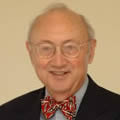Jerone N. Deverman

B.S. Mathematics 1960, M.S. Mathematics 1962, Ph.D. Statistics 1969
Founder and Principal Consultant, Medical Data Systems
Written by: Andrea Rau, Ph.D. candidate in Statistics
More than thirty years after finishing his degree at Purdue, Jerone N. "Jer" Deverman can sum up much of his success in a single word – serendipity. After all, Deverman is the first to admit that his path to becoming an independent consultant specializing in health care systems has been far from direct over the years. "I’ve never had a 5-year plan!" said Deverman. "There’s a lot of serendipity involved, being in the right place at the right time."
Deverman has been quick to open himself to new opportunities his entire life. After an internship with Caterpillar Tractor Company during his senior year of high school in Pekin, Illinois, Deverman decided to come to Purdue to study metallurgy. However, shortly after arriving, he found himself drawn instead to mathematics and statistics. Soon after, he changed majors and eventually received his B.S. and Master’s degrees in Mathematics. Midway through his Ph.D. in Mathematical Statistics, Deverman was called to serve his two-year ROTC active duty obligation during the Vietnam Conflict. He was assigned to do test design and analysis for Joint Task Force Two, a large-scale, low-altitude aircraft penetration and reconnaissance testing program of the Joint Chiefs of Staff in Albuquerque, New Mexico. After serving his time as an Army officer, Deverman returned to Purdue to finish his degree. He earned his Ph.D. in 1969 working under then Statistics Department Chair, Shanti Gupta.
The work Deverman did for Joint Task Force Two, as well as the many summer internships he obtained during his years at Purdue, proved to be a valuable asset in subsequent years. "Summer jobs are good financially, but especially for experience and contacts," advised Deverman. In particular, his work with Sandia National Labs in both Albuquerque, New Mexico, and Livermore, California, prior to finishing his Ph.D. eventually led to a job as a member of Sandia’s technical staff following graduation. From there, Deverman moved to Dikewood Corporation, a think-tank organization specializing in defense research, as a senior research statistician. "On my first day at Dikewood," said Deverman, "they asked me to help with their new Health Care Information Systems area, and that is the niche I’ve been working in ever since."
In 1977, after several years of experience working with healthcare claims and encounters data at Dikewood, Deverman decided to leave to start up his own business, Medical Data Systems. With only one potential client lined up and a four-month contract, "I should have been scared to death!" Deverman joked. However, the contract was quickly expanded, and a short time later, by a twist of fate, Deverman found his next client – Caterpillar – which was to be the first of many Fortune 100 clients over the years.
Other clients Deverman has served over his many years of consulting have included state and federal programs such as Medicaid and CHAMPUS (now Tri-Care), insurance carriers, third-party administrators (TPA’s), health maintenance organizations (HMO’s), and Fortune 100 self-administering corporations. Deverman typically works with between three and five clients at a time, and spends a great deal of his time traveling coast to coast to work with them on-site. When finding new clients, Deverman often relies on word-of-mouth recommendations, especially as marketing can be difficult for an independent consultant. "It is very difficult to do the work and market yourself," said Deverman. When meeting with new clients, he is also careful to consider the problem at hand. Big consulting companies can afford to take on risky jobs, but "for a one-man show, you have to look at the chance of success," said Deverman. "I only take work where I think I’m going to make a difference."
During the Spring 2007 semester, Deverman returned to Purdue as a visiting professor and taught a course in healthcare plans, data, and financing within the Actuarial Science program. He has also served on the Board of Directors of the Purdue Alumni Association, the Dean’s Advisory Council (Dean Harry Morrison), the College of Science Alumni Board, and is a member of the Purdue President’s Council. Deverman is a frequently invited speaker at national conferences and institutes and has won many awards, including the Distinguished Alumnus Award from the College of Science at Purdue in 1995 and an induction into the Purdue Army ROTC Hall of Fame in 1997.
A common element throughout Deverman’s career has been his flexibility and his eagerness to seek out new opportunities. "What I have done since my Ph.D. was greatly affected by what I did before my Ph.D.," said Deverman. "Don’t always be looking towards the future – make the best of today; otherwise you will shut off many of the opportunities that you get early on."
To read more Alumni Profiles, please visit our Alumni Profiles archive.